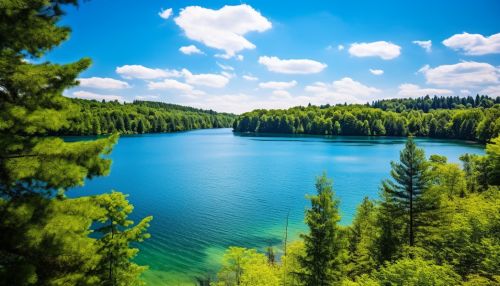Michigan
Geography
Michigan, located in the Midwestern region of the United States, is the only state to consist of two peninsulas. The Lower Peninsula, often referred to as the mitten due to its shape, is home to the majority of the state's population and includes the state capital, Lansing. The Upper Peninsula, or the U.P., is separated from the Lower Peninsula by the Straits of Mackinac, a five-mile channel that joins Lake Huron to Lake Michigan. The two peninsulas are connected by the Mackinac Bridge, one of the longest suspension bridges in the world.


The state's diverse geography includes the Great Lakes, the largest group of freshwater lakes on Earth by total area. Michigan borders four of the five Great Lakes: Lake Erie, Lake Huron, Lake Michigan, and Lake Superior. The Great Lakes significantly influence Michigan's climate, contributing to its high humidity in the summer and the heavy lake-effect snowfall in the winter.
Michigan's terrain ranges from sandy beaches and coastal marshes along the Great Lakes, to rolling plains and fertile farmland in the Lower Peninsula, to rugged hills and rocky outcrops in the Upper Peninsula. The state is also home to over 11,000 inland lakes and 36,000 miles of streams, earning it the nickname "Water Wonderland".
History
The history of Michigan is a story of the interaction between Native American tribes, European explorers, and American settlers. The area was first inhabited by various Native American tribes, including the Ojibwe, Ottawa, and Potawatomi tribes. French explorers arrived in the early 17th century, establishing the first European settlements at Sault Ste. Marie and St. Ignace.
Michigan became a part of the United States as part of the Northwest Territory following the American Revolutionary War. In 1837, Michigan was admitted as the 26th state of the Union. The state's early economy was primarily based on the fur trade, lumbering, and mining. The discovery of copper and iron in the Upper Peninsula led to a mining boom in the mid-19th century.
In the early 20th century, Michigan became a major industrial hub with the rise of the automobile industry. The city of Detroit emerged as the world's automotive capital, with companies like Ford, General Motors, and Chrysler establishing their headquarters there.
Economy
Michigan's economy has undergone significant transformations over the centuries. From its early days of fur trading and natural resource extraction, the state's economy has evolved into a diverse mix of industries.
The automotive industry remains a significant part of Michigan's economy. The state is home to the "Big Three" American automakers: Ford, General Motors, and Chrysler. Michigan also has a strong presence in auto parts manufacturing and other related industries.
In addition to automotive, Michigan has a robust agricultural sector. The state is a leading producer of cherries, blueberries, apples, cucumbers, and milk. Michigan's diverse agricultural output also includes corn, soybeans, and wheat.
The state's economy has also diversified into sectors such as information technology, aerospace, and military equipment production. Michigan is home to several major corporations, including Dow Chemical, Whirlpool, and Kellogg Company.
Demographics
Michigan has a population of approximately 10 million people, making it the 10th most populous state in the U.S. The state's largest city, Detroit, is home to about 670,000 residents. Other major cities include Grand Rapids, Warren, Sterling Heights, and Lansing.
The state has a diverse population, with a mix of different ethnicities and cultures. According to the U.S. Census Bureau, the racial composition of Michigan is approximately 79% White, 14% African American, 5% Hispanic or Latino, and 3% Asian.
Education
Michigan has a strong educational infrastructure with a mix of public and private institutions. The state's public education system includes primary and secondary schools, as well as community colleges and public universities. The University of Michigan and Michigan State University are among the state's most prestigious public universities.
The state also has a number of private colleges and universities, including Hillsdale College, Kalamazoo College, and Calvin University. Michigan's higher education institutions are known for their research contributions in areas such as engineering, medicine, and social sciences.
Culture
Michigan's culture reflects its history and diversity. The state has made significant contributions to music, with Detroit being the birthplace of the Motown sound. Michigan has also had a significant impact on the world of literature, with authors like Ernest Hemingway and Elmore Leonard having ties to the state.
Michigan is also known for its outdoor recreational activities, thanks to its numerous lakes and parks. Popular activities include boating, fishing, hiking, and hunting. The state's natural beauty is celebrated in many local festivals and events, such as the National Cherry Festival in Traverse City.
